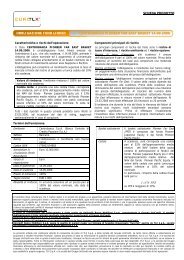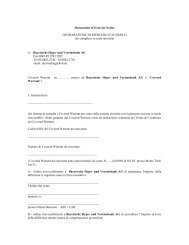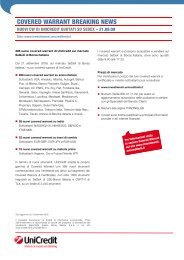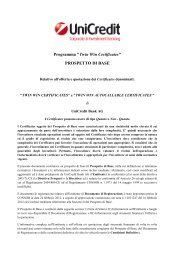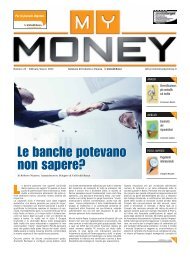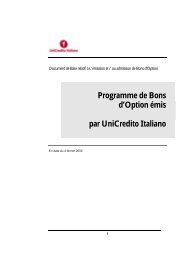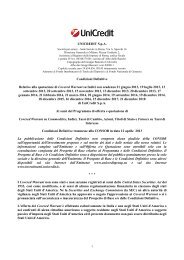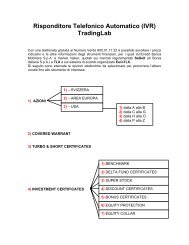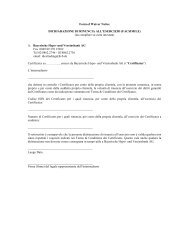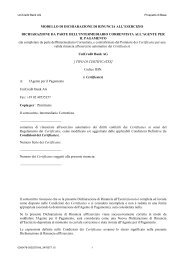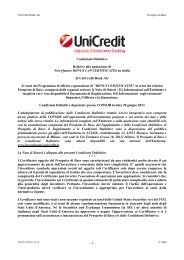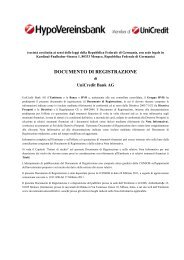UniCredit Bank AG
UniCredit Bank AG
UniCredit Bank AG
You also want an ePaper? Increase the reach of your titles
YUMPU automatically turns print PDFs into web optimized ePapers that Google loves.
opportunities that may arise from further volatility that can be expected on the financial markets and from a slow<br />
recovery in the real economy.<br />
Legal Risks/Arbitration Proceedings<br />
Medienfonds lawsuit<br />
Numerous investors who invested in VIP Medienfonds 4 GmbH & Co. KG have filed complaints and lawsuits<br />
against <strong>UniCredit</strong> <strong>Bank</strong> <strong>AG</strong>. The main reason for these actions is the fact that the tax deferrals, which were<br />
originally part of the benefits achieved by the investment, will no longer apply according to the current position<br />
of the tax authorities. <strong>UniCredit</strong> <strong>Bank</strong> <strong>AG</strong> did not market the fund, but it did grant investment finance loans to all<br />
investors for a portion of the investment amount. Moreover, to collateralise the fund, <strong>UniCredit</strong> <strong>Bank</strong> <strong>AG</strong><br />
assumed various payment obligations of film distribution companies vis-à-vis the fund.<br />
At the end of 2009 suits were pending against <strong>UniCredit</strong> <strong>Bank</strong> <strong>AG</strong> for a total value in dispute in the low tripledigit<br />
million Euro range.<br />
The complaints and suits against HVB are based on the allegation that HVB culpably violated its obligations to<br />
provide information prior to signing the contracts as it was aware that the fund’s structure and execution<br />
allegedly made it highly risky in tax respects. Moreover, the lawsuits are based on alleged errors in the<br />
prospectus, for which the plaintiffs say HVB is responsible along with the initiator and other persons. A few<br />
first-instance rulings have been issued. In some cases, courts have ruled against HVB because of alleged<br />
violations of obligations to inform the investors whereas some suits have been dismissed. So far, none of the<br />
rulings on these matters are final. The Munich Higher Regional Court (Oberlandesgericht) has started a test case<br />
procedure pursuant to the Capital Markets Test Case Act (KapMuG) that – among other matters – is intended to<br />
clarify the question of responsibility for the prospectus, also on the part of <strong>UniCredit</strong> <strong>Bank</strong> <strong>AG</strong>, with regard to<br />
the banking services it provided.<br />
Some investors based their claims on formal deficiencies regarding the investment finance loans granted to<br />
investors in order to be able to unwind their whole investment vis-à-vis HVB.<br />
From today's perspective, the situation in the legal proceedings and the outcome of the claims of investors is<br />
unclear. HVB has set up adequate provisions for these proceedings. In order to amicably settle the alleged claims<br />
and to bring the complex lawsuits to a reasonable end, <strong>UniCredit</strong> <strong>Bank</strong> <strong>AG</strong> jointly with another German bank<br />
involved that marketed the predominant part of the fund share, recently decided to make a settlement offer to the<br />
investors.<br />
Real estate finance/financing of purchases of shares in real estate funds<br />
<strong>UniCredit</strong> <strong>Bank</strong> <strong>AG</strong> will not suffer negative legal consequences if customers cancel their property loan<br />
agreements under the Doorstep Transactions Act (Haustürwiderrufsgesetz). According to the law and the<br />
opinion on this subject expressed in the German Supreme Court's (Bundesgerichtshof) established practice, the<br />
customer, who is required to prove that the conditions for cancelling the contract have been met, must repay the<br />
loan amount to the bank, including interest at customary market rates, even after cancellation of the loan<br />
agreement.<br />
Under a well-established body of court decisions, the bank would be required to assume the investment risk<br />
because of its failure to notify the customer of his right to cancel the contract only if the customer could prove<br />
that he would not have made the investment if he had been aware of this right; in addition, the German Supreme<br />
Court has decided that the bank would only have to assume the investment risk in case of culpable actions. On<br />
the basis of court rulings issued so far, HVB does not expect any negative effects in such cases.<br />
HVB's claim to repayment remains in effect even if the borrower issued an invalid proxy to a third party, and<br />
HVB relied on the validity of the proxy when entering into the loan agreement. Based on the experience gained<br />
to date, HVB assumes that legal risks will not arise fromf these cases.<br />
Judgements from the German Supreme Court recently also confirm the already narrow conditions for a possible<br />
obligation on the part of HVB to give information and advice. The German Supreme Court makes it easier for<br />
investors to provide evidence of violations of a bank's obligation to give information only in cases of<br />
institutionalised collaboration between the bank funding the acquisition of the property and the seller of the<br />
property. Recent judgements also indicate that a bank's liability cannot be ruled out completely if it has advised<br />
the customer on the acquisition of the property and received commission from the seller for selling the property.<br />
Based on its experience so far, HVB does not expect any negative effects for <strong>UniCredit</strong> <strong>Bank</strong> <strong>AG</strong> in this respect<br />
either.<br />
If a bank finances the purchase of shares in real estate funds for the borrower with a loan not secured by a real<br />
property lien, the borrower can – if the transaction is a so-called related transaction – contest the claim of the<br />
financing bank to repayment on the basis of objections which the borrower is entitled to assert against the seller<br />
or agent in the fund transaction on account of having received inocrrect advice. Consequently, the bank has no<br />
- 20 -



